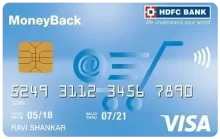HDFC Bank UPI RuPay Credit Card
HDFC Bank has launched a new HDFC Bank UPI RuPay Credit Card that lets you link it with your UPI ID and use it for payments on apps like Paytm, PhonePe, Mobikwik, Google Pay, and more. This is the first time you can use a credit card with UPI, making it easier to pay for everyday things. The card is designed to be simple, secure, and perfect for people who use UPI apps like BHIM.
With this card, you can earn 3% cashback on things like groceries, dining, and supermarket purchases, and 2% cashback on utility payments. Even though it's a virtual card (no physical card), it works smoothly and securely on UPI apps. It's a great option if you use UPI often, offering a low annual fee and rewards called Cash Points for every transaction you make.
You can also get a renewal fee waiver if you spend Rs. 25,000 or more in the previous year. The Cash Points you earn can be redeemed for different options, with 1 Cashpoint worth Rs. 0.25. Overall, this card is a good choice for UPI users who want to earn rewards while making payments easily.
Rewards and Benefits
- 3% CashPoints on grocery shopping, supermarket purchases, dining, and PayZapp transactions. (You can earn a maximum of 500 Points in a month)
- 2% CashPoints on utility payments (You can earn a maximum of 500 Points in a month)
- 1% CashPoints on other purchases, except rent, wallet loads, EMI, fuel, insurance payments, and government-related payments. (You can earn a maximum of 500 Points in a month)
Fees & Charges
What should you consider before applying for a credit card in India?
Key Considerations Before Applying for a Credit Card in India:
- Eligibility Criteria: Ensure you meet the eligibility requirements, which typically include age, income, credit score, and employment status as defined by the issuing bank or financial institution.
- Credit Score: A strong credit score can significantly improve your chances of approval and result in more favorable terms, such as lower interest rates or higher credit limits. Verify that your credit score is healthy before applying.
- Interest Rates and Fees: Compare the annual percentage rates (APR), processing fees, late payment penalties, and foreign transaction charges associated with various cards. These costs can vary widely and impact the overall value of the card.
- Rewards and Benefits: Evaluate the rewards, cashback, discounts, or other perks offered by the card to ensure they align with your spending patterns. Some cards may provide better benefits in specific categories, such as travel, shopping, or dining.
- Credit Limit: Review the credit limit offered by the card to ensure it meets your financial needs. Avoid applying for cards with excessive limits if you are concerned about managing debt, as this can lead to higher interest charges.
- Repayment Terms: Understand the repayment structure, including the minimum payment amount, payment due dates, and any associated penalties. Being clear about these terms can help you manage payments effectively and avoid interest buildup.
- Card Type and Features: Choose a card type that matches your specific needs—whether standard, premium, or specialized cards like those offering travel rewards or dining privileges. Ensure the features of the card align with your lifestyle and spending habits.
- Bank’s Reputation: Opt for a financial institution with a proven reputation for customer service and transparency. Consider researching customer reviews and assessing their support channels to ensure reliable service.
- Hidden Charges: Be aware of any hidden fees, including annual fees, balance transfer charges, foreign transaction fees, or cash withdrawal charges. These can add up over time and affect the overall cost-effectiveness of the card.
- Credit Utilization: Maintain a balance within your credit limit to avoid high credit utilization ratios, which can negatively impact your credit score. Responsible use of credit is essential for maintaining financial health.
- Long-Term Financial Plans: Consider how the credit card fits into your overall financial strategy. Avoid accumulating unnecessary debt and choose a card that supports your long-term financial goals without adding financial strain.
How can I link the HDFC Bank RuPay UPI credit card to UPI apps?
To link the card, simply open any UPI app (like Paytm, Google Pay, PhonePe, Mobikwik, etc.), use your credit card pin to register it, and you can start making UPI payments right away.
Can I withdraw cash with this credit card?
Yes, cash withdrawals are allowed, but there’s a charge of 2.5% of the withdrawal amount or Rs. 500, whichever is higher.
Is there a limit on the CashPoints I can earn?
Yes, CashPoints have monthly caps. You can earn up to 500 points on grocery, supermarket, dining, PayZapp, and utility spends each month, with 500 points at 3%, 2%, and 1% cashback respectively. Other spends are also capped at 500 points per month.
Is there a minimum transaction amount for earning CashPoints?
Yes, to earn CashPoints, the minimum transaction amount must be Rs. 100 or more.
Why am I not earning CashPoints on all my transactions?
If you’re not earning CashPoints, it could be due to reaching the monthly cap or the transaction type not qualifying (such as cash advances, fuel, rent payments, and EMI spends).
Can I get the UPI RuPay Credit Card as a standalone card?
No, the UPI RuPay Credit Card cannot be issued as a standalone card and must be used as an additional floater card.
Can I get a physical version of the HDFC Bank UPI RuPay Credit Card?
No, the card is only available in digital form and not as a physical card.





Leave a Reply